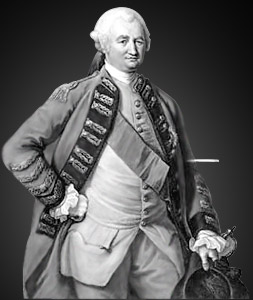 Robert Clive, formally known as Major General Robert Clive, 1st Baron Clive, KB, was the British administrator and military leader who founded the political and military dominance of the British East India Company in Bengal. He cemented the economic power that allowed the British Empire in India to grow, as well as forging the strong connections between India and Britain that still exists today. He was also known as Clive of India and along with Warren Hastings, Robert Clive secured political supremacy in India. He was one of the major personalities who formed British India.
Robert Clive, formally known as Major General Robert Clive, 1st Baron Clive, KB, was the British administrator and military leader who founded the political and military dominance of the British East India Company in Bengal. He cemented the economic power that allowed the British Empire in India to grow, as well as forging the strong connections between India and Britain that still exists today. He was also known as Clive of India and along with Warren Hastings, Robert Clive secured political supremacy in India. He was one of the major personalities who formed British India.
Early Life of Robert Clive
Robert Clive was born on 29th September 1725 in Market Drayton, Shropshire, England to the parents Rebecca Gaskell Clive and Richard Clive. He studied in 3 schools as he was expelled from each school for his mischievous behaviour, including Market Drayton Grammar School and Merchant Taylors` School in London. Although at a later period Clive improved his studies and completed his education.
Career of Robert Clive
Robert Clive joined the British East India Company, which was Britain`s trading company in India, in 1743. In the year 1747, he received a commission in the company`s armed services. During that period, the British and French were struggling for control of India, and Clive won several important victories over the French and their Indian allies. In 1757, he led 3,200 troops to victory over 50,000 enemy troops at the Battle of Plassey, giving Britain control their first base in India. They won over the rich province of Bengal.
Though Clive began his career as a clerk he won a great repute as a soldier. Clive proved himself to be a daring soldier and a great military genius in battle he fought, whether in the siege of Arcot, the recapture of Calcutta, the capture of Chandranagar, the victory of Plassey, the defeat of Shah Alam, the Mughal emperor, the defeat of the Dutch of Chinsura or the capture of the Northern Circars, in every way he left his impression. He was twice appointed governor of Bengal. In this position he consolidated British power in India. He purified the administration of the Company by removing various abuses, such as corruption, anarchy and confusion. He introduced dual government in Bengal in 1765. From 1765 to 1772 the administration of Bengal was carried on by two powers, the British and the Nawab of Bengal and hence this system came to be known as the Dual System. Since it proved defective it was brought to an end by Warren Hastings in 1772.
After completing his first governorship, Robert Clive returned to England in 1760 and entered Parliament. He was greatly honoured by the British supremacy and was awarded the title of Lord as well as was made a peer in the Upper House. In 1767, after his second governorship he returned to England on grounds of ill-health. In 1773, some of Clive`s enemies persuaded Parliament to investigate his career in India. The investigation showed that Clive had made a fortune; but that he had also rendered great and meritorious service to his country Mental Sickness during the last year of his life caused Clive to become an opium addict. He committed suicide on 22 November 1774 at the age of 49 years.
The residence of Robert Clive in Chennai is situated inside the premises of Fort St. George in Chennai. A palatial building, it is now known as Clive House and is under the care of the Archaeological Survey of India.



















